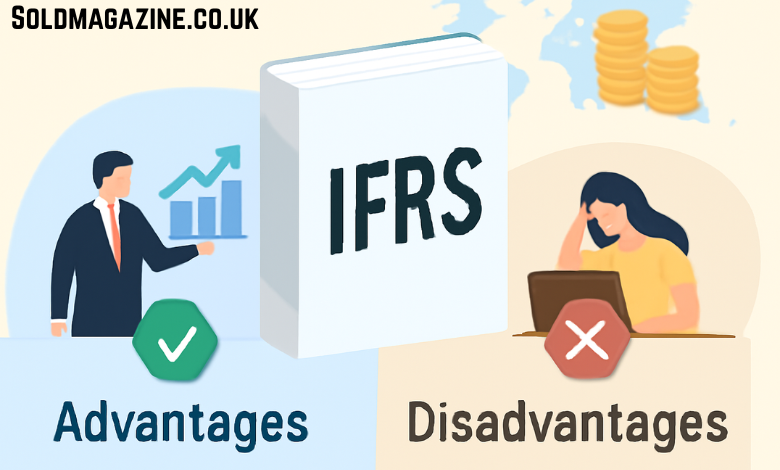Maintaining consistent financial reports becomes an arduous task for multinational companies (MNCs) operating in global markets. Inbound investment has its challenges; every country has its own policies on how financial reporting is done. Many companies have resorted to IFRS (International Financial Reporting Standards) because these guidelines help businesses report their financial results in a consistent, transparent, and comparable manner across different countries. However, is it all fully beneficial? Let’s dive into the Advantages and Disadvantages of IFRS for MNCs.
So, What’s IFRS Anyway?
Let’s start with the basics. IFRS is a global set of accounting rules designed to make financial statements easier to understand and compare no matter where a company operates. It was put together by the International Accounting Standards Board (IASB), and it’s now used by businesses in over 140 countries. It’s like a universal language for financial reports, especially for companies that have to work across borders. MNCs like it because it helps streamline their financial reporting across their various locations.
What’s So Great About IFRS?
1. More Transparency
One of the biggest advantages of Diploma in IFRS is that it makes financial reports a lot clearer. With IFRS, companies have to follow the same accounting rules, whether they’re in the U.S., Europe, or Asia. This consistency makes it much easier for investors and regulators to understand the company’s financial situation. If you’re an investor, for example, you don’t have to worry about whether you’re comparing apples to oranges when looking at financial statements from different regions.
This clarity builds trust too. When stakeholders know what they’re looking at, they’re more likely to feel confident in the company’s financial health.
2. Easier Comparisons Across Borders
MNCs operate all over the world, so trying to make sense of financial data from different countries that follow different standards can get messy. You’ve got teams in the U.S. working with one set of rules, teams in Germany using another, and teams in Japan doing their own thing. This makes it tough to compare performance across the board.
By adopting IFRS, MNCs can pull everything together under one roof. No more wondering if the financial data from a German office is comparable to the figures from a branch in Brazil. With IFRS, the playing field is leveled.
3. Cutting Costs in the Long Run
When big multinational corporations work across several countries, each branch usually needs its own team to learn the local accounting rules. That adds up to a huge amount of time, money, and energy just to keep everyone aligned. By switching to people having a Diploma in IFRS, a single, clear set of guidelines is used everywhere, cutting down on the need for local, expert training in every single market.
Once IFRS is in place, the company can streamline its accounting processes and reduce duplication of work. The result? Lower costs for the company. It’s all about efficiency.
4. Easier Access to Capital
There are both advantages and disadvantages of IFRS and if a company wants to raise capital, the easier it is for investors to understand its financial health, the better. When you use IFRS, investors from anywhere in the world can quickly get a grasp of your financial reports. That means MNCs can access a bigger pool of global investors.
Instead of having to explain your financial statements in 10 different ways, you’ve got one standard that international investors can understand right away. This can make it easier to attract investment from all corners of the world.
But, Not Everything is Perfect With IFRS
1. The Transition Isn’t Cheap
Switching to IFRS can feel like scaling a mountain. For multinational corporations, the leap to IFRS means a full systems makeover. They can’t simply pull a lever and call it done; teams must train, software must refresh, and many firms lean on outside advisers to ensure that every number and footnote sticks to the IFRS playbook. The upfront bill can rack up fast, and the project list is lengthy.
That’s hard to like, especially if a company’s current reporting systems are set in stone and not IFRS-friendly. Aligning everyone, every report, and every ledger takes calendar weeks and hard cash.
2. IFRS Can Be Tricky to Apply
While IFRS offers more flexibility than other accounting standards, that can also make it harder to apply consistently. IFRS is based on principles, which means it leaves room for interpretation. On paper, that sounds good because it lets companies tailor things to their own needs, but in practice, it can lead to some inconsistencies.
For instance, two companies might follow the same rule but interpret it slightly differently, which means their financial statements could look a little different, even though they’re supposed to be following the same standard. This makes it harder to compare companies in the same industry, especially if one company is more conservative and another takes more risks in its reporting.
3. More Variability in Reporting
Because IFRS is flexible, it can lead to more variability in how companies report their finances. For example, how a company decides to value certain assets or recognize revenue might vary from one firm to another. Even if both companies are under IFRS, their reports might not be 100% comparable because of these subjective decisions.
If you’re trying to analyze financials, this variability can make your life a little harder. It’s not a huge problem when you’re looking at a small number of companies, but for big MNCs with global operations, it can create a bit of a headache.
4. Navigating Tax Issues
For multinational companies, the choice to switch to IFRS can trip them up if the country’s tax system still sits on local accounting rules. Even if the country has plans to upgrade, partial adoption or outright denial can create mismatches. Bottom line: tax bills could jump, or the math behind them could suddenly change. Either way, the company’s earnings take a hit.
Competitors may be tough, yet the only way to avoid a messy tax surprise is to have a game plan. That means chats with local tax administrators and seasoned advisors long before the IFRS switch. Missing a detail feels like dropping a card in a house of cards – everything can collapse.
Wrapping It Up
Switching to IFRS gives multinational companies (MNCs) some clear plus points, more openness, simpler side-by-side comparisons, and possible cost cuts. There are drawbacks, too. The changeover isn’t cheap, and keeping IFRS rules steady in various markets can feel like trying to thread a needle. Even so, for MNCs that operate in several nations, staying under the IFRS diploma usually pays off over time.
If you’re looking to get a better handle on IFRS and its impact, getting a diploma in IFRS could be a solid move. It can help you navigate the complexities and ensure your company is using IFRS in the most effective way.




